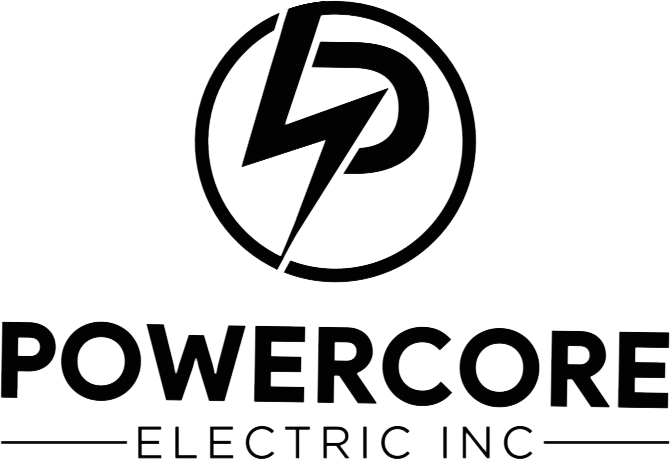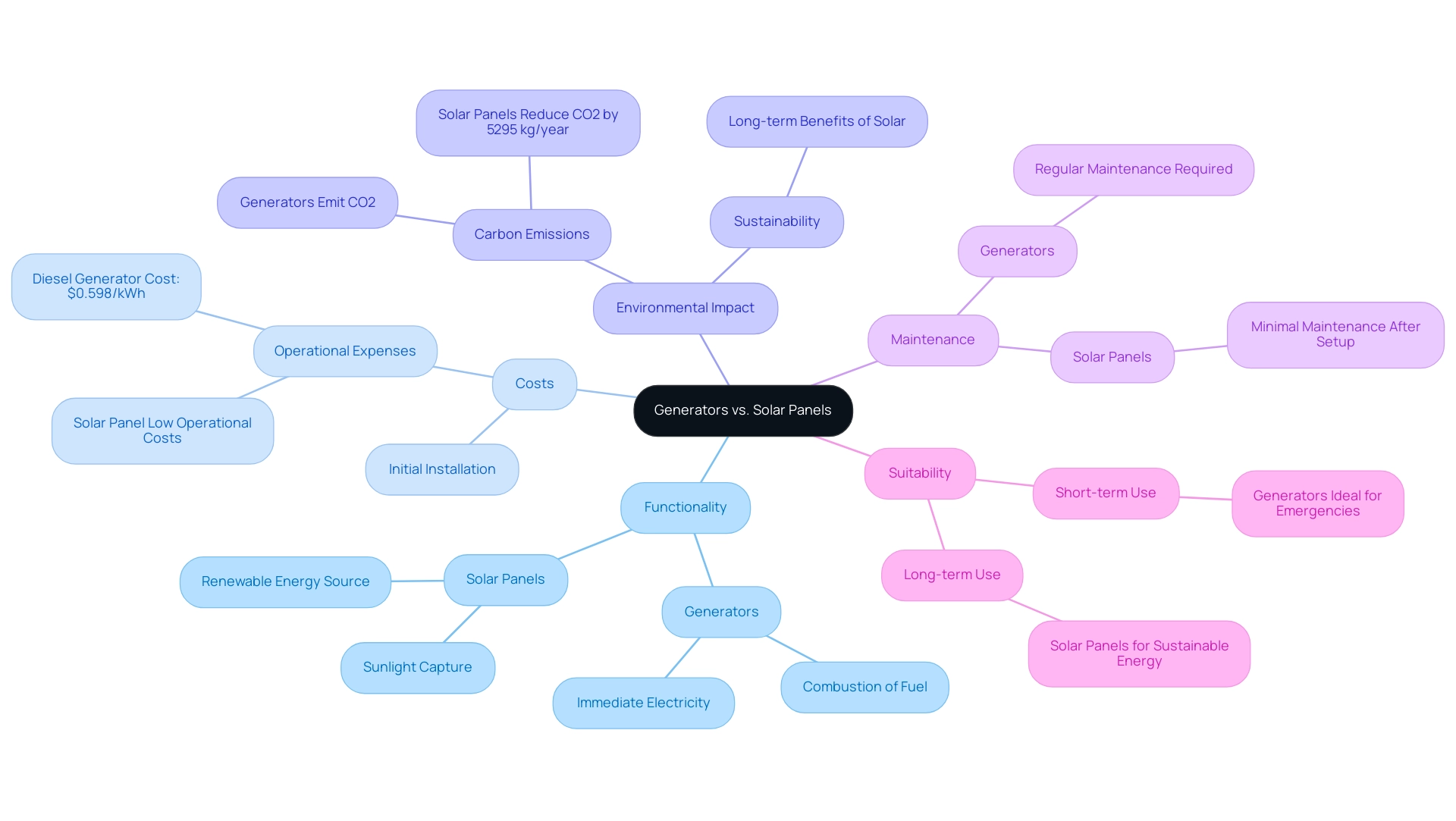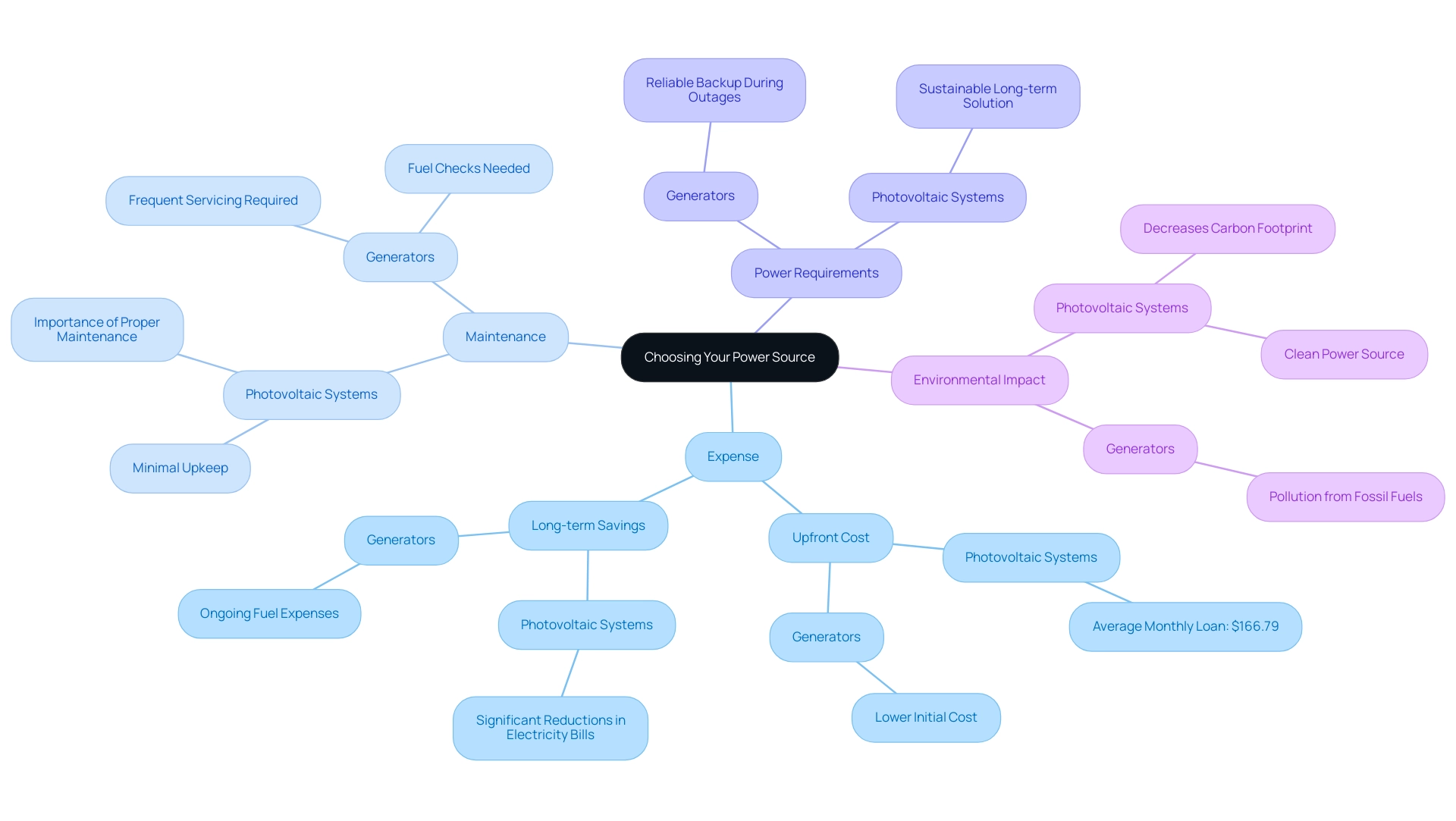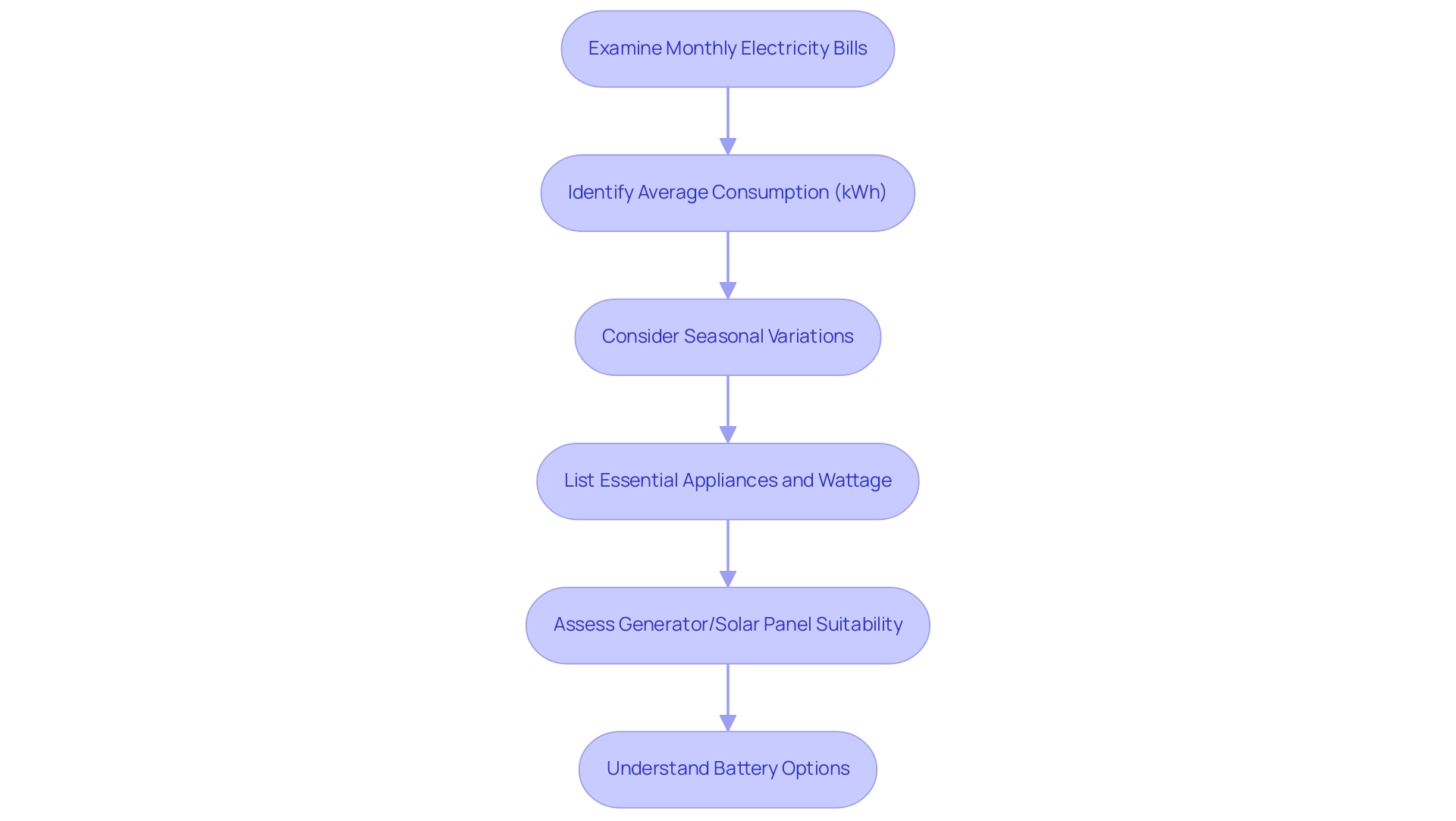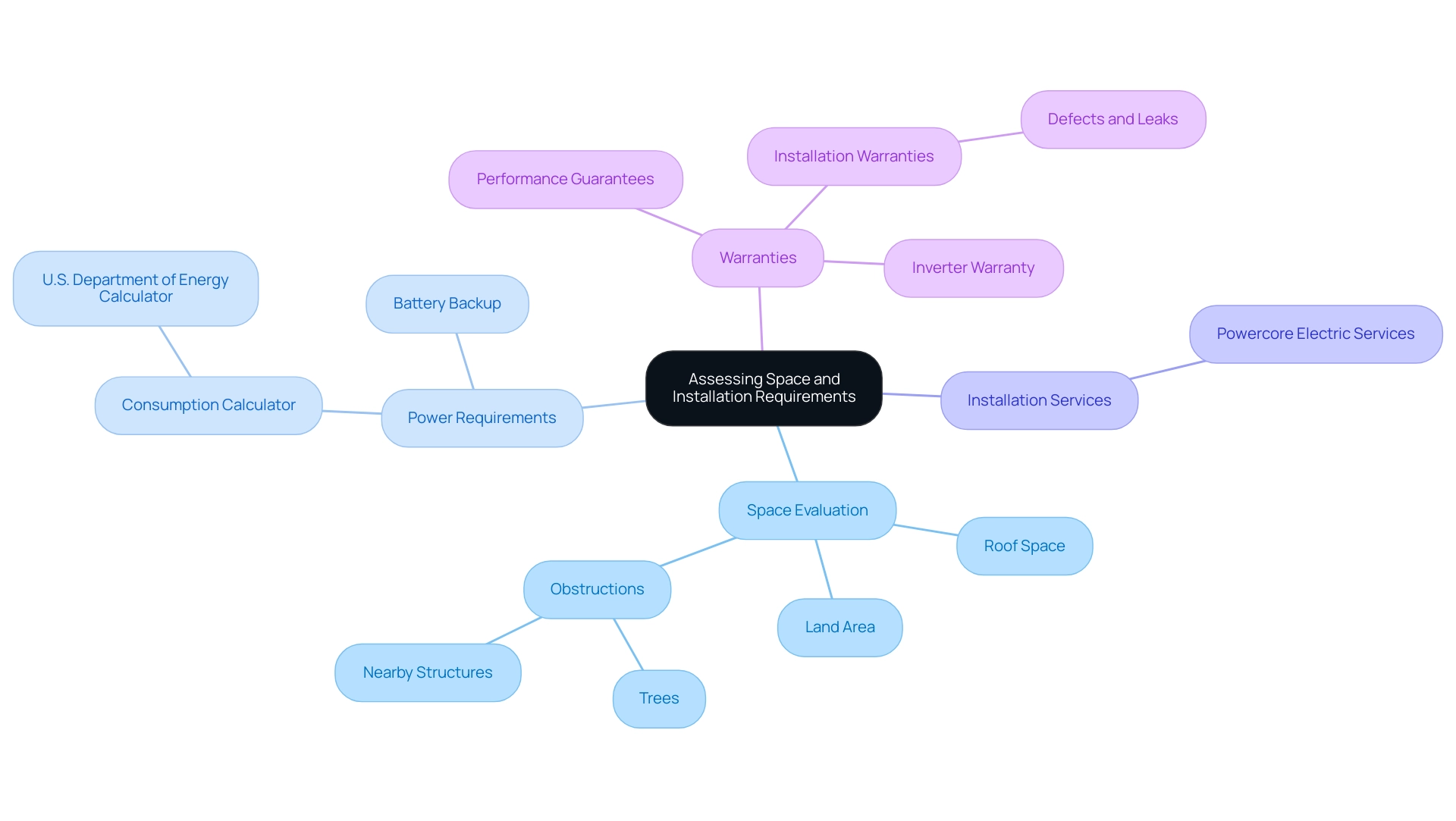Introduction
Choosing the right power source for a home can feel overwhelming, especially with so many options available today. For Long Beach renters, the choice often boils down to two popular contenders: generators and solar panels. Each has its own set of benefits and drawbacks, making it essential to understand how they operate and what they offer.
-
Generators
- Provide immediate electricity, perfect for short-term needs or emergencies.
-
Solar Panels
- Harness the sun’s energy, promising long-term savings and a reduced carbon footprint.
As the conversation around sustainable energy continues to grow, exploring these options can lead to informed decisions that not only meet immediate needs but also contribute to a healthier planet. By examining practical considerations, energy requirements, and installation specifics, renters can navigate this decision with confidence, paving the way for a more efficient and sustainable energy future.
Understanding Generators vs. Solar Panels: Key Differences
When assessing power sources, it’s crucial for Long Beach renters to comprehend the differences in how a generator or solar panels function. Generators, which function by combusting fuel, provide immediate electricity and are ideal for short-term needs or emergencies, while solar panels are a renewable alternative. They come in both portable and stationary forms but require regular maintenance and a consistent supply of fuel, with diesel power costs around $0.598 per kWh.
In contrast, generator or solar panels capture sunlight to generate electricity, providing a renewable energy solution that not only decreases long-term electricity costs but also significantly diminishes carbon emissions—approximately 5,295 kg of carbon dioxide yearly. A case study titled ‘Long-term Benefits of Photovoltaic Systems’ reveals that photovoltaic systems are generally a better long-term investment compared to a generator or solar panels when considering performance, costs, and environmental impact. Although the installation of generator or solar panels involves an initial cost, they provide low operational expenses and require minimal maintenance once set up.
Recent reports also indicate that while portable generators or solar panels have stable output and are easy to transport, their running costs can escalate over time due to rising fuel prices. By understanding these key differences, you can make an informed choice about which power source best suits your requirements and lifestyle, paving the way for a more sustainable future. To investigate your choices further, obtain your complimentary personalized assessment for energy installation today!
Additionally, explore available government programs and incentives that can assist you in transitioning to renewable energy and maximize your savings.
Practical Considerations for Choosing Your Power Source
When it comes to selecting between a generator and photovoltaic systems, Long Beach renters should consider several practical factors that can significantly impact their decision:
- Expense: While the use of a generator or solar panels generally requires a larger upfront expenditure, averaging a monthly photovoltaic loan of approximately $166.79 in certain areas, they can provide significant long-term savings on electricity costs. In contrast, a generator or solar panels may have a lower upfront cost but incur ongoing fuel expenses and regular maintenance costs. Furthermore, tenants in Long Beach can investigate local government initiatives like the California Solar Initiative, which provides rebates for renewable energy installations, and the Property Assessed Clean Energy (PACE) program, which enables homeowners to finance clean energy projects through their property taxes.
- Maintenance: A generator or solar panels are celebrated for their minimal upkeep needs; they mainly require occasional cleaning and inspections to operate efficiently. According to the comprehensive guide on solar panel upkeep, proper maintenance is vital for ensuring they function at maximum efficiency and protect your investment. Conversely, maintaining reliability in a generator or solar panels demands more frequent servicing and fuel checks, which adds to overall costs.
- Power Requirements: Examine your household’s power consumption patterns closely. If you need a reliable backup during power outages, a generator might suit you better. However, if your goal is to invest in a sustainable, long-term energy solution, you should consider using a generator or solar panels. Given California’s abundant sunshine and high utility rates, the National Renewable Energy Laboratory emphasizes the state’s potential for maximizing savings through home energy installations, making it a smart choice for Long Beach renters. Testimonials from local renters highlight significant reductions in their electricity bills after switching to solar, demonstrating the financial benefits firsthand.
- Environmental Impact: A generator or solar panels shine as a clean power source, significantly decreasing your carbon footprint. On the other hand, a generator—particularly one reliant on fossil fuels—can contribute to pollution, whereas solar panels do not. As you assess these choices, reflect on your dedication to sustainability.
By carefully analyzing these elements, you can select a solution that not only fulfills your current requirements but also corresponds with your long-term objectives for efficiency and sustainability. Remember, proper maintenance is crucial for solar panels to ensure they operate at maximum efficiency and protect your investment.
Evaluating Your Energy Needs
To effectively assess your power requirements, start by examining your monthly electricity bills to identify your average consumption measured in kilowatt-hours (kWh). Pay attention to seasonal variations; for instance, during the scorching summer of 2020, nearly 90% of U.S. households relied on air conditioning, resulting in significant spikes in power consumption, as reported by the U.S. Energy Information Administration’s 2020 Residential Consumption Survey. Furthermore, keep in mind that 34% of households in the United States possess two or more refrigerators, which can further affect your consumption.
Creating a comprehensive list of your essential appliances along with their wattage is crucial for accurately calculating the total power required during peak usage times. This comprehensive evaluation not only assists in measuring whether a generator or solar panels can adequately sustain your requirements during outages but also helps establish if they could offer a sustainable solution for your daily power usage. It’s important to note that homes equipped with electric heating systems typically consume more electricity than those using natural gas or heating oil, which is a vital factor in your calculations.
For instance, in Wyoming, the average monthly electricity usage is 765 kWh, with an average bill of $12.81, illustrating typical consumption patterns. To choose the best inverter and battery solutions for your home involving generator or solar panels, consider the following steps:
- Understand the basic functionality of solar panels, including how they convert sunlight into electricity and how this relates to your household power requirements.
- Investigate the best battery options that can store surplus power generated during the day for use at night or during outages.
- Consult user manuals for specific troubleshooting tips and best practices for installation and maintenance.
By understanding these dynamics, you empower yourself to make informed decisions regarding your power options.
Assessing Space and Installation Requirements
Before diving into installation, it’s crucial to evaluate the space available on your property. For a generator or solar panels, ensure you have sufficient roof space or land that receives plenty of sunshine to optimize power generation. Be mindful of potential obstructions—like trees or nearby structures—that could cast shadows on your surfaces, affecting their performance.
To precisely evaluate your power requirements, the U.S. Department of Energy provides a calculator that can assist you in comprehending your individual consumption. Powercore Electric offers top-notch panel installation services customized to your particular requirements, assisting you in attaining independence in power. For photovoltaic battery systems, choosing the appropriate battery backup is crucial for effective power storage and ensuring your home stays powered, even during outages.
When it comes to a generator or solar panels, having a flat and stable surface for placement is key. Familiarize yourself with local regulations regarding noise and emissions, especially if opting for a gas-powered generator, as proper ventilation is vital for safe operation. Don’t overlook warranties; your energy system should include performance guarantees for modules, a 10-year warranty for inverters, and installation warranties covering defects and leaks.
By thoroughly evaluating these installation prerequisites and comprehending the warranties offered, you can efficiently establish your generator or solar panels systems with Powercore Electric, ensuring they fulfill your power demands while encouraging sustainability and independence in your community. Contact us for your free quote.
Making the Decision: Generator or Solar Panels?
Once you’ve carefully evaluated your energy requirements, practical aspects, and installation prerequisites, it’s time to decide which option suits you best. If your heart leans toward sustainability and you seek long-term savings, a generator or solar panels from Powercore Electric might just be the perfect fit for your home. As a locally-owned company, we understand the unique electrical needs of California communities, ensuring tailored solutions that maximize efficiency and savings.
On the flip side, if you’re seeking immediate power solutions during emergencies or if upfront costs are a concern, a generator or solar panels could be your best bet. It’s important to note that both systems offer unique advantages and can even work harmoniously together. Many homeowners find joy in having greater flexibility in their power use with both a generator or solar panels.
As one homeowner noted, “Having both systems gives me peace of mind knowing I can rely on renewable sources while still having backup options.” Remember, at Powercore Electric, we are committed to providing unmatched quality craftsmanship and a customer-first approach. Whichever path you take should resonate with your personal values and lifestyle needs.
Furthermore, reaching out for a free, personalized estimate can help you fine-tune your choice to ensure it aligns perfectly with your goals. Contact us today to explore how our sustainable energy solutions can benefit you and to get your free estimate.
Conclusion
Choosing the right power source for a home involves careful consideration of various factors, especially for Long Beach renters weighing the benefits of generators versus solar panels.
- Generators offer immediate power solutions, making them ideal for short-term needs or emergencies, but they come with ongoing fuel costs and maintenance demands.
- Solar panels provide a sustainable energy solution that not only reduces carbon emissions but also leads to significant long-term savings on electricity bills.
Evaluating practical considerations such as cost, maintenance, energy needs, and environmental impact is essential in making an informed decision.
- While solar panels may require a higher initial investment, they offer lower operational expenses and minimal upkeep once installed.
- On the other hand, generators might seem more accessible upfront but can incur escalating costs over time.
- Understanding your energy consumption patterns and assessing your space for installation can further guide this choice.
Ultimately, the decision between a generator and solar panels hinges on individual priorities and lifestyle needs.
- Emphasizing sustainability and long-term savings can lead many to favor solar panels, while those seeking immediate solutions may lean towards generators.
- Whichever option is chosen, it’s crucial to align the decision with personal values and energy goals.
By taking the time to explore all options, renters can pave the way for a more efficient and sustainable energy future.
